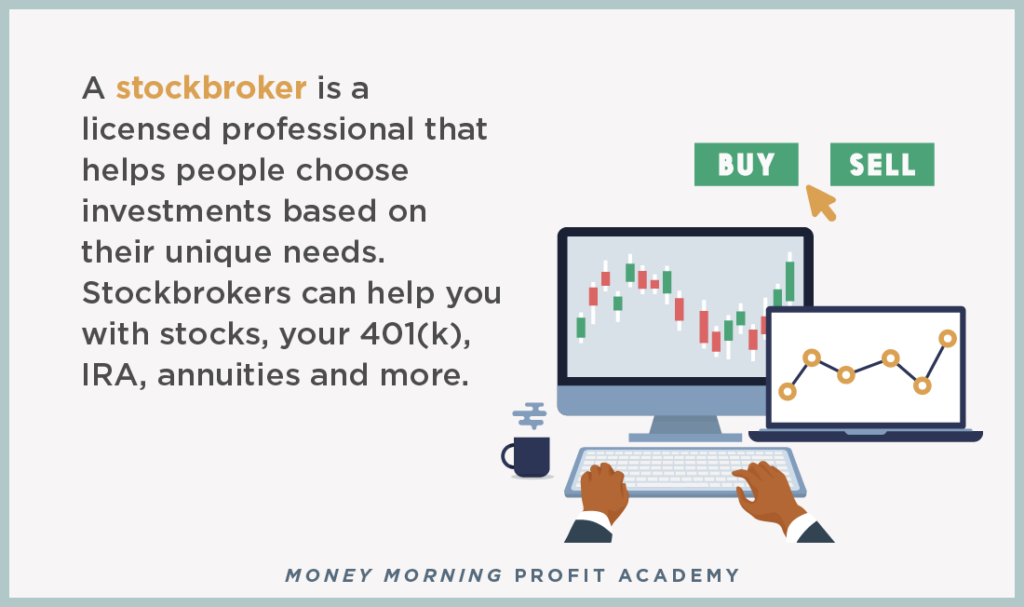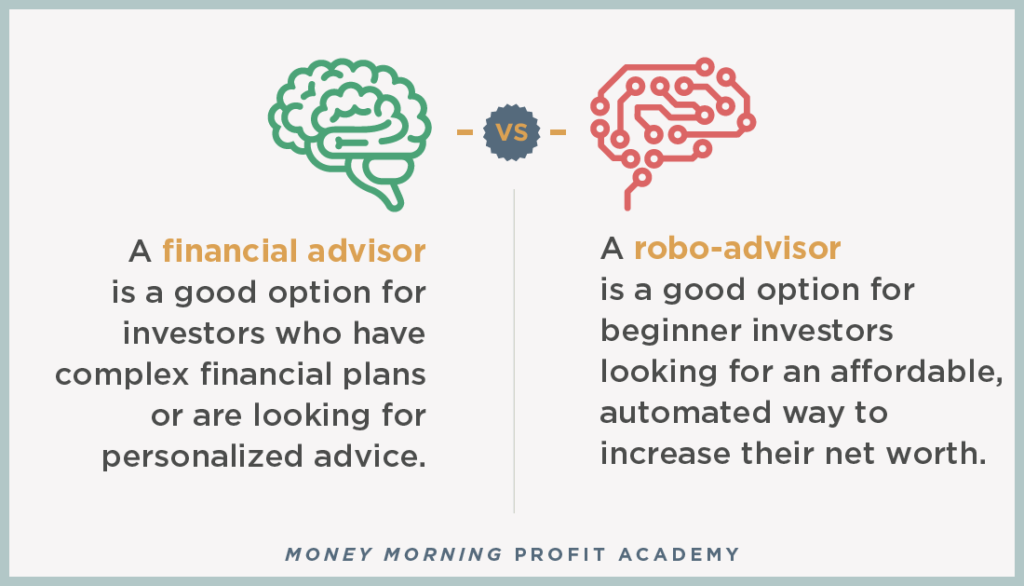
Once you’ve opened your investing account, you’re ready to get started on building your portfolio. But which investments do you make?
With over 3,000 stocks in the United States alone, it’s understandable that you’d want guidance on how to make the best investments.
That’s where a stockbroker comes in.
With their professional knowledge and expertise, they help buy and sell stocks to help clients reach their financial goals.
But not all investment advice is created equal, so it’s important to know what a stockbroker does and how they do it so you can make an informed decision about your choice.
Here, we explain what stockbrokers do, if you should use one, and explain your portfolio management options.
What Is a Stockbroker?
A stockbroker is a professional that is licensed to help you choose the right investment products based on your needs. Their role is to buy and sell shares on your behalf and advise you on your financial options.

Most stockbrokers work for a brokerage firm like Merrill Lynch, Charles Schwab, or TDAmeritrade. At these brokerage firms, they handle a number of accounts, including those for both individuals and institutions. Generally, they are paid on a commission basis by these brokerage firms.
While they will help you find the best stocks to buy, stockbrokers can help with several other investments, including your 401(k), IRA, annuities, and more.
What Do Stockbrokers Do?
Stockbrokers facilitate the trading of stocks for individuals or businesses. A stockbroker can be an actual person, like a financial advisor, or a robo-platform where investors can make trades themselves. Whether you work with a full-service stockbroker or a discount broker depends on your needs.
Full-Service Stockbrokers vs Discount Brokers
Stockbrokers can either be full-service brokers or discount brokers.
Full-service brokers help with a number of other financial planning needs (retirement planning, long-term care planning, estate planning, etc.) in addition to facilitating trades. They often meet with their clients face-to-face every year and discuss their financial planning needs. These full-service brokers offer their financial advice with a more hands-on approach.
Discount brokers merely execute trades. An example of a discount broker is Robinhood, which is an online broker. On platforms like these, investors can log on, purchase their own stocks, and make trades without ever talking to a real advisor. This less hands-on approach is good for investors who already know what they’re looking for. These discount brokers are generally more affordable as they charge fewer fees and offer commission-free trading.
How Do Stockbrokers Make Money?
Here is where it gets interesting.
Although it may seem like a stockbroker has their clients’ best interests in mind, this isn’t always the case. The reason for this is because stockbrokers make their money based on commission and sales of products, just like other professionals in sales roles. To answer the question “what does a stockbroker do?” concisely, they sell!
While brokers will execute the trades you ask for, they also make a commission on the type of investments you buy. That means they make more money by getting you to buy a financial product with a higher commission.
Stockbrokers usually work through large financial institutions like Charles Schwab or Merrill Lynch and these organizations dictate which products their brokers can sell.
Brokers have earned a reputation for pushing expensive, unnecessary, and complicated products on their clients. Annuities might be the best example of a high commission product that simply doesn’t make sense for most investors. But brokers are known for pushing these products on average investors due to their high commissions.
Why Your Stockbroker Isn’t Your Friend
As you can see, stockbrokers have a lot more on their minds than being your friend and even doing what’s right for your portfolio all the time.
Brokers are only obligated to follow the suitability standard when it comes to recommending investments to clients. As long as their recommendations are “suitable” for a client’s objectives, risk tolerance, and budget, they are free to push the most expensive products or those that pay the highest commissions. And this is exactly what stockbrokers do.
If you’re going to use a broker, make sure they’re simply executing the trades you’re asking for.
Alternatives to Traditional Stockbrokers
Luckily, you have a few other options instead of working with a traditional stockbroker. Let’s look at your choices and help you decide which one is best for you.

Fiduciary Financial Advisors
A financial advisor that is a fiduciary is held to a higher standard than mere suitability. They must act in your best interest. That means if they are recommending an investment to you, it’s not meant to benefit them, but just you as the investor.
While fiduciaries are better for financial advice than a broker, that advice can cost you.
Many financial advisors will handle all your investment decisions for you while also helping you plan for retirement or other life goals. This can be an excellent service, but they typically charge a percentage fee of your assets under management. The more money you accumulate, the more their fee will cost you. A 1% fee on assets under management will be $5,000 when $500,000 is being managed.
If you want to use a financial advisor, we recommend finding a fiduciary who charges a fixed fee per meeting. These fee-only advisors will give you the same professional advice and help you plan for retirement or other major expenses, but they won’t eat into your returns by taking a cut of your money.
Robo-Brokers
With today’s technology, there has been a rise in online discount brokers, and some are even offered by the big broker-dealers we talked about earlier. But the benefit is that you can manage your own portfolio and trade stocks on your own, without paying a stockbroker a commission or without paying a fee to a financial advisor.
NerdWallet did a roundup of some of the best online stockbrokers and included E*TRADE, TD Ameritrade, Merrill Edge, and Robinhood in their picks. Of course, you’ll still need to manage your portfolio yourself, but that’s even better for you. Knowing exactly where your money is invested, why it’s invested there, and what kind of returns you’re making is essential for taking control of your financial future.
Setting Up Your Own Portfolio
We created this series on building a stock portfolio to help you understand the different types of investing accounts, how to make trades, if you should work with a broker or not, and a number of other commonly asked questions.
When it comes to working with a stockbroker, the choice is yours! Some investors prefer to have the human touch, but that may come with its own drawbacks like not always being the best strategy for your goals.
Some investors prefer working with a financial advisor, but that can get costly. And some investors want to DIY their portfolio using a robo-platform. This option is great for those who want to take control of their finances and set themselves up for success through intelligent, profitable investing.
Speaking of intelligent investing, learn more about the true meaning of diversification in the next lesson.


